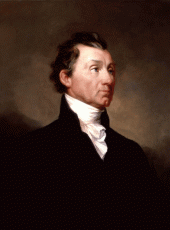To the Senate of the United States:
I nominate the persons whose names are stated in the inclosed letter from the Secretary of War for the appointments therein respectively proposed for them.
The changes in the Army growing out of the act of the 2d of March, 1821 "to reduce and fix the military peace establishment of the United States," are exhibited in the Official Register for the year 1822, herewith submitted for the information of the Senate.
Under the late organization of the artillery arm, with the exception of the colonel of the regiment of light artillery, there were no grades higher than lieutenant-colonel recognized. Three of the four colonels of artillery provided for by the act of Congress of the 2d of March, 1821, were considered, therefore, as original vacancies, to be filled, as the good of the service might dictate, from the Army corps.
The Pay Department being considered as a part of the military establishment, and, within the meaning of the above-recited act, constituting one of the corps of the Army, the then Paymaster-General was appointed colonel of one of the regiments. A contrary construction, which would have limited the corps specified in the twelfth section of the act to the line of the Army, would equally have excluded all the other branches of the staff, as well that of the Pay Department, which was expressly comprehended among those to be reduced. Such a construction did not seem to be authorized by the act, since by its general terms it was inferred to have been intended to give a power of sufficient extent to make the reduction by which so many were to be disbanded operate with as little inconvenience as possible to the parties. Acting on these views and on the recommendation of the board of general officers, who were called in on account of their knowledge and experience to aid the Executive in so delicate a service, I thought it proper to appoint Colonel Towson to one of the new regiments of artillery, it being a corps in which he had eminently distinguished himself and acquired great knowledge and experience in the late war.
In reconciling conflicting claims provision for four officers of distinction could only be made in grades inferior to those which they formerly held. Their names are submitted, with the nomination for the brevet rank of the grades from which they were severally reduced.
It is proper also to observe that as it was found difficult in executing the act to retain each officer in the corps to which he belonged, the power of transferring officers from one corps to another was reserved in the general orders, published in the Register, till the 1st day of January last, in order that upon vacancies occurring those who had been put out of their proper corps might as far as possible be restored to it. Under this reservation, and in conformity to the power vested in the Executive by the first section of the seventy-fifth article of the general regulations of the Army, approved by Congress at the last session, on the resignation of Lieutenant-Colonel Mitchell, of the corps of artillery, Lieutenant-Colonel Lindsay, who had belonged to this corps before the late reduction, was transferred back to it in the same grade. As an additional motive to the transfer, it had the effect of preventing Lieutenant-Colonel Taylor and Major Woolley being reduced to lower grades than those which they held before the reduction, and Captain Cobb from being disbanded under the act. These circumstances were considered as constituting an extraordinary case within the meaning of the section already referred to of the Regulations of the Army. It is, however, submitted to the Senate whether this is a case requiring their confirmation; and in case that such should be their opinion, it is submitted to them for their constitutional confirmation.
JAMES MONROE.
James Monroe, Special Message Online by Gerhard Peters and John T. Woolley, The American Presidency Project https://www.presidency.ucsb.edu/node/206522

